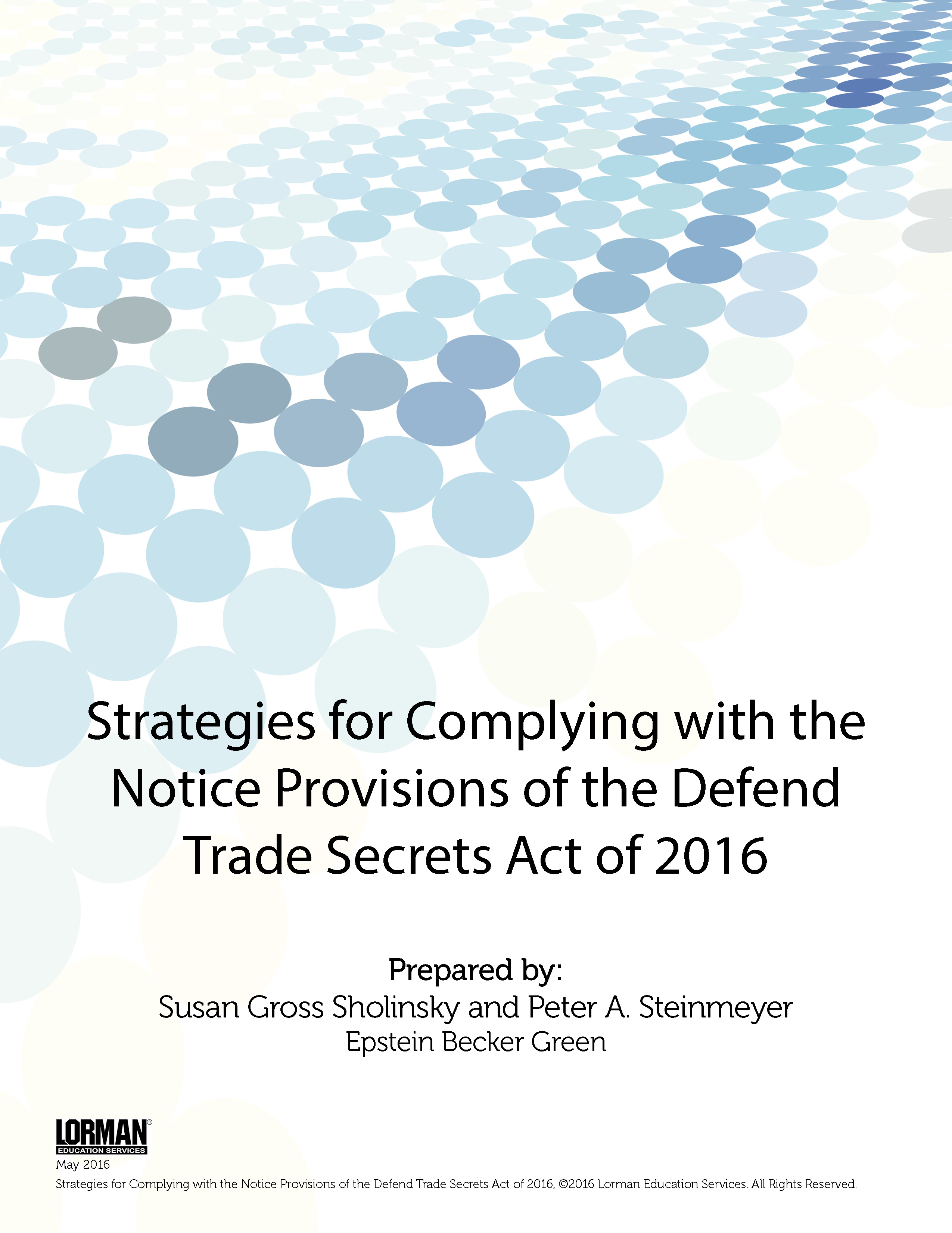Aside from the federal protections provided under the DTSA, most states (and the District of Columbia, but not New York or Massachusetts) have already adopted a version of the Uniform Trade Secrets Act (“UTSA”), which provides a cause of action for the theft of trade secrets under state law. There are a number of differences, however, among these state laws. The DTSA does not eliminate or preempt state law remedies, but rather supplements them. Notably, the DTSA grants employers access to federal court—regardless of the amount in controversy—and provides uniformity across the patchwork of state laws.
Like the UTSA, the DTSA allows employers to obtain the following: (i) equitable remedies, (ii) actual damages, (iii) punitive damages, and (iv) reasonable attorneys’ fees. In addition to these remedies, the DTSA includes the extraordinary remedy of an ex parte seizure order in certain extreme circumstances.”
Download this white paper to continue reading …
Susan Gross Sholinsky is a member of Epstein Becker & Greeen, P.C.’s Employment, Labor & Workforce Management practice, in the New York office. She counsels clients on a variety of matters, in a practical and straightforward manner, with an eye toward reducing the possibility of employment-related claims.
Peter A. Steinmeyer is a managing shareholder of the Chicago office of Epstein Becker & Green, P.C. He is the co-chair of the Firm’s Non-Competes, Unfair Competition and Trade Secrets Practice Group, and co-writes the blog: www.tradesecretsnoncompetelaw.com.
Agenda
Faculty

Susan Gross Sholinsky
Epstein Becker & Green, P.C.
- Holds multiple leadership positions within the national law firm of Epstein Becker Green, P.C., including as a member of the Firm’s Board of Directors, as Chair of the Employment, Labor & Workforce Management Steering Committee, and as Vice Chair of the Firm’s Diversity and Professional Development Committee. Susan also serves on the Executive Committee of the Firm’s Women’s Initiative.
- Serves as New York Co-Chair of 50/50 Women on Boards: Global Conversation on Board Diversity.
- Serves as a member of the Board of Trustees of the Dalton School.
- Serves on the Advisory Committee of a New York-Based Private Retail Company.
- Adjunct Faculty Member at the Cornell University School of Industrial and Labor Relations and speaker at multiple DEI and employment law conferences and events, including The DEI Summit: Diversity Officers & HR Taking Charge, The Deloitte Academy, and Innovation@Work US Virtual Event, hosted by The Economist.
- Named to Chambers USA: The World’s Leading Lawyers for Business, New York – Labor & Employment (2022-2023), as well as The Legal 500 United States, Workplace and Employment Counseling (2019-2022).
- Recognized as one of 2020’s Responsible 100 by City & State New York, an award bestowed upon private-sector leaders whose work makes life better in communities in New York City and across the state.
- Counsels employers nationally on a variety of employment law matters to help them anticipate issues, ensure compliance, and avoid problems under federal, state, and local laws.
- Can be contacted at [email protected] or (212) 351-4789.
All of your training, right here at Lorman.
Pay once and get a full year of unlimited training in any format, any time!
- Live Webinars
- OnDemand Webinars
- MP3 Downloads
- Course Manuals
- Audio Recordings*
- Executive Reports
- White Papers and Articles
- Sponsored Live Webinars
Additional benefits include:
- State Specific Credit Tracker
- Members Only Newsletter
- All-Access Pass Course Concierge
* For audio recordings you only pay shipping
Questions? Call 877-296-2169 to speak with a real person.
Thank You!
Download White PaperMore Program Information

Access to all training products $699/year
Unlimited Lorman Training
With the All-Access Pass there is no guessing what you will need for your yearly training budget. $699 will cover all of your training needs for an entire year!
Easy Registrations
Once you purchase your All-Access Pass you will never be any further than one-click away from attending any Lorman training course.
Invest in Yourself
You haven't gotten to where you are professionally by luck alone; it's taken a lot of hard work and training. Invest in yourself with the All-Access Pass.